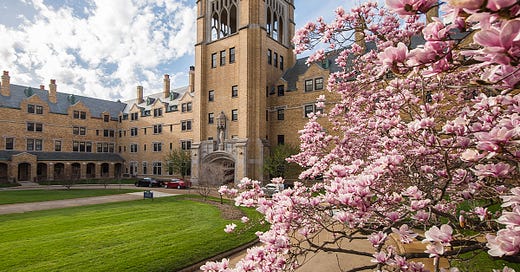
Rhoades urges St. Mary’s College to ‘correct’ transgender policy
Bishop Kevin Rhoades urged on Monday that a Catholic women's college reverse its transgender admissions policy.
Indiana’s Bishop Kevin Rhoades pushed back Monday on a plan that would allow enrollment for students who identify as female, regardless of biological sex, to enroll at St. Mary’s College, a women’s college in South Bend, Indiana.
Rhoades, the bishop of Fort Wayne-South Bend, issued a Nov. 27 statement which “urge[d] the Board of Trustees of Saint Mary’s College to correct its admissions policy in fidelity to the Catholic identity and mission it is charged to protect and to reject ideologies of gender that contradict the authoritative teachings of the Catholic Church regarding the human person, sex and gender.”
“The desire of Saint Mary’s College to show hospitality to people who identify as transgender is not the problem. The problem is a Catholic woman’s college embracing a definition of woman that is not Catholic,” the bishop added.
The bishop’s statement came after the Notre Dame Observer reported Nov. 21 that Saint Mary’s College had approved an undergraduate admissions policy that would admit students “whose sex is female or who consistently live and identify as women.”
Approval for the policy came from the university’s board of trustees in June, while university president Kate Conboy said in an email to students and staff last week that the college was still developing a plan to roll out the new policy, but would begin considering applicants who identify as transgender in 2024.
For his part, Rhoades wrote Monday that he should have been included in St. Mary’s decision-making on the issues.
“It is disappointing that I, as bishop of the diocese in which Saint Mary’s College is located, was not included or consulted on a matter of important Catholic teaching,” the bishop wrote.
“To call itself a ‘women’s college’ and to admit male students who ‘consistently live and identify as women’ suggests that the college affirms an ideology of gender that separates sex from gender and claims that sexual identity is based on the subjective experience of the individual,” he added.
“This ideology is at odds with Catholic teaching.”
While Rhoades urged a reversal at the college, he did not indicate how he would respond if St. Mary’s College implements its policy.
The bishop would seem to have several options available to him, if he decides to respond with authoritative measures to the decision. After a formal warning, he could prohibit the university from identifying itself as Catholic, or he could prohibit the reservation of the Blessed Sacrament in some campus chapels, or public celebration of the Mass at the university.
As of the time of publication, Rhoades has not yet responded to request for comment from The Pillar.
For her part, Conboy said last week her university’s approach is consistent with other Catholic women’s colleges.
In her email last week, Conboy said that St. Mary’s College was “by no means the first Catholic women’s college to adopt a policy with this scope.”
The Pillar has identified several Catholic women’s colleges with similar admissions policies, but Rhoades appears to be the first diocesan bishop to respond publicy to transgender policies at Catholic women’s colleges.
In Los Angeles, Mount St. Mary’s University said its admissions policy “is that any student who was born female or who identifies as female is eligible for admission to our traditional undergraduate women's university.”
A spokesperson for the Archdiocese of Los Angeles told The Pillar Monday that the archdiocesan communications office was “not aware of any statements by the archdiocese” regarding that policy.
In St. Joseph, Minnesota, the College of St. Benedict’s policy is to “consider for undergraduate admission those applicants who were assigned female at birth as well as those who were assigned male or female at birth but now consistently live and identify as female, transgender, gender fluid or nonbinary.”
The College of St. Benedict’s is located in the Diocese of St. Cloud, and is closely connected with St. John’s University, a Benedictine men’s college which considers for admission “those applicants who were assigned male at birth as well as those who were assigned female or male at birth but now consistently live and identify as male, transgender, gender fluid or nonbinary.”
Diocesan communications director Joe Towalski told The Pillar Monday that St. Cloud’s bishop “keeps an ongoing conversation” with the colleges, and “talks with them about what his priorities and concerns are.”
But the colleges “set their own policies,” Towalkski emphasized. “They determine their policies on their own.”
In St. Paul, Minnesota, St. Catherine University “admits all students who identify as women to the College for Women.” The Archdiocese of St. Paul and Minneapolis has not yet responded to questions from The Pillar regarding its response to that policy.
St. Mary’s College was founded in 1844 by the Sisters of the Holy Cross, and is located nearby to the University of Notre Dame. The college has 1,600 undergraduate students, and a $201 million endowment.












Thank you Bishop Rhoades!
Thank you for covering this important story in the life of the Church, Pillar.
I read Bishop Rhoades’ letter, and it is very clear and well written. He includes excerpts from relevant writings from Popes JP2, Benedict, and Francis. He focuses on the Christian imperative to love in truth and charity, and explains how this SMC decision misses the mark on truth. I will pray for the BOD of SMC to reverse this decision ASAP.